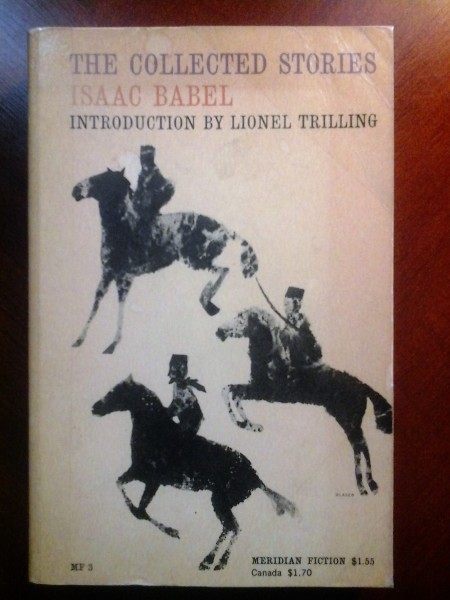
SmokeLong‘s “Flash, Back” series asks writers to discuss flash fiction that may be obscure or printed before the term “flash fiction” became popular, and tell us how these older or not widely-known works are meaningful. Stefen Styrsky waxes poetic on the day he discovered Isaac Babel and it changed his life. Submit your own “Flash, Back” or other flash-related essays on our Submittable page!
By Stefen Styrsky
Isaac Babel arrived in my life like a bolt from the blue, or maybe I should say like a Cossack horde appearing on the horizon. It was at Myopic Books, a used bookstore on Milwaukee Avenue in Chicago, near Wicker Park, an old neighborhood of odd-angled intersections and flatiron buildings.
It was pure chance, me fortuitously catching Babel’s name as my eyes swept the shelves. The Collected Stories. The cover image: three men on galloping horses, an abstract representation that appeared to be a sponge print; the cover itself helpfully taped at the corners and along the spine. The tape probably kept the book whole, enabling it to travel from its publication in 1960 — through who knows how many hands and boxes and personal libraries — to me in that year of 2008.
I’d often heard Babel mentioned in connection with other great short story writers, especially his fellow countrymen — Gogol, Turgenev, and Chekhov – artists who had developed and honed the story into the shape we know today. Floating around in my head were a few other Babel-related items absorbed over years of indiscriminate reading. There was his observation, so perfect a writerly sentiment it’s suspiciously apocryphal: “Nothing pierces the human heart like a period in the right place.” That his last public words, shouted as Stalin’s secret police hauled him off to the gulag, were, “But I’m not finished yet!”
When I returned to my hotel room that evening I dove right in and read the first few stories from the book’s opening section, Red Cavalry. (Attesting to the power of Babel’s stories, I can’t recall why I was in Chicago, my memory of the time completely subsumed by initial exposure to his prose). I had no idea what to expect. Stories, obviously, but my imaginings hadn’t prepared me for these compact, visceral tales.
The first paragraph of the first story, Crossing into Poland:
The Commander of the VI Division reported: Novograd-Volynsk was taken at dawn today. The Staff had left Krapivno, and our baggage train was spread out in a noisy rearguard over the highroad from Brest to Warsaw built by Nicholas I upon the bones of peasants.
Followed by two brief pages that end with the narrator awakening alongside a dead man he’d unknowingly lain next to when bedding down in a civilian’s house for the night. The man’s face is hacked in two and “in his beard blue blood was clotted like a lump of lead.” We learn that soldiers of the invading army killed the man the previous day, the same army the narrator marches with. The dead man’s daughter, who perhaps allowed the narrator to sleep next to the corpse as a kind of gruesome revenge, asks aloud in the story’s final line, “I should wish to know where in the whole world you could find another father like my father?”
Under a thousand words; it barely tops 850. History and war, horror and pathos, all in one compact package. I shivered with jealousy and awe. Who was this writer and when had he composed such brief stories? Babel seemed thoroughly modern, despite writing about a minor conflict from a previous century. I flipped to the copyright page. The book was a reissue of a translation published in 1929 by Alfred A. Knopf. And so here was not just an amazing writer, but here also was flash before flash technically existed. Before the writing of the short-short story was considered a separate prose genre.
Later, I’d learn from Lionel Trilling’s introduction that Isaac Babel began his career as a journalist in Odessa and often based his fiction on details he picked up. During the Russo-Pole war of 1920-1923 he rode alongside the Russian Cossack cavalry as a correspondent for Soviet periodicals. Bespectacled, asthmatic, and Jewish, Isaac Babel was everything the Cossacks were not, men literally born to the saddle, brought up riding horses across the steppe, who demonstrated outright disdain for “intellectuals,” and possessed a long and deep experience with violence, especially against Jews. Somehow, he earned their grudging acceptance. The thinly-fictionalized stories in Red Cavalry depict the evolution of outcast into tolerated colleague. Most are as short as Crossing into Poland. Only a few reach beyond five pages. So not only was Babel an early practitioner of flash fiction. In Red Cavalry he also stumbled into what is these days called the flash novella: a series of flash or very short pieces that comprise an entire story arc.
But it wasn’t simply Babel’s hyper-compressed style that prompted my reaction. There was first and foremost his language. It’s vivid, energetic and extremely tight. His stories come across as dispatches from the front, reports dashed off in the fire and heat of combat.
Then there are his metaphors which seem conjured from the fevered edge of dreams:
Savitstky, Commander of the VI Division, rose when he saw me, and I wondered at the beauty of his giant’s body. He rose, the purple of his riding breeches and the crimson of his little tilted cap and the decorations stuck on his chest, cleaving the hut as a standard cleaves the sky. The sickly sweet freshness of soap emanated from him. His long legs were like girls sheathed to the neck in shining riding boots. (“My First Goose”)
And many descriptions in Red Cavalry simultaneously combine the horrible and the sacred. Acts of violence and destruction arrive in terms that seem almost holy. Consider this final paragraph from the one-page story Prishchepa’s Vengeance:
On the third night the settlement saw smoke rising from Prishchepa’s hut. Torn, scorched, staggering, the Cossack led the cow out of the shed, put his revolver in its mouth and fired. The earth smoked beneath him. A blue ring of flame flew out of the chimney and melted away, while in the stall the young bull that had been left behind bellowed piteously. The fire shone as bright as Sunday. Then Prinschepa untied his horse, leaped into the saddle, threw a lock of his hair into the flames, and vanished.
The Red Cavalry stories were so head-clearing they became one of the first times I actually studied how an author employed language. From Babel I learned that word choice could imbue a story with an emotional volume that belied its scant word count. Consider how powerful Crossing into Poland becomes with that final word: father. That the reader will intuit much in a story without having to be told. And that metaphors should not merely describe, but also reveal meaning. Above, the images around Savitsky convey the man’s dominating grandeur and beauty.
I revisit the Red Cavalry stories often. The language is forever fresh, the situations forever revealing of new angles and modes of interpretation. And, obsessed as I am, I’ve obtained other versions. In 2003 W.W. Norton issued the Complete Works of Isaac Babel translated by Peter Constantine. Red Cavalry was also printed as its own volume. I bought the 2013 Boris Dralyuk’s version from the Pushkin Collection not only because it’s an engaging translation, but also because the volume is sized perfectly to fit inside a coat pocket, making it easy to carry and pull out whenever I require a Babel fix.
No translation is perfect, but all three manage to capture the essence of Babel’s unmistakable work. Sometimes I’ll play a little game and lay the three side by side, each open to the same passage. Then I’ll try to decide which I like best, which I think comes closest to what Babel intended, where his periods, commas, paragraphs, and words seem to be in just the right place.
 Stefen Styrsky is a graduate of the writing program at Johns Hopkins University. His fiction and essays have appeared or are forthcoming in Litbreak, The Offing, Number Eleven Magazine, and the Tahoma Literary Review. He is currently at work on a series of stories based on a theme from Babel. He lives in Washington, DC.
Stefen Styrsky is a graduate of the writing program at Johns Hopkins University. His fiction and essays have appeared or are forthcoming in Litbreak, The Offing, Number Eleven Magazine, and the Tahoma Literary Review. He is currently at work on a series of stories based on a theme from Babel. He lives in Washington, DC.

 The core workshop of SmokeLong Fitness is all in writing, so you can take part from anywhere at anytime. We are excited about creating a supportive, consistent and structured environment for flash writers to work on their craft in a community. We are thrilled and proud to say that our workshop participants have won, placed, or been listed in every major flash competition. Community works.
The core workshop of SmokeLong Fitness is all in writing, so you can take part from anywhere at anytime. We are excited about creating a supportive, consistent and structured environment for flash writers to work on their craft in a community. We are thrilled and proud to say that our workshop participants have won, placed, or been listed in every major flash competition. Community works.